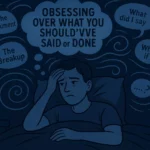Table of Contents
You’re brushing your teeth, and suddenly—there it is again. That memory. That conversation. That look. The thought feels involuntary, like someone else pressed “play” on a scene you’ve watched a thousand times. You spit, rinse, and try to move on. But the loop begins. Again.
If you’re wondering how to break free, CBT for rumination might be the tool you need.
Breakup rumination is brutal. It hijacks your peace with “what ifs,” rewrites your past with “if onlys,” and stalks your present with “why did they.” And the worst part? You know it’s not helping—but you can’t seem to stop.
This post is about what to do when you’re stuck in that loop. Not just how to survive it, but how to change the way your mind reacts when it wants to obsess. It’s not about forgetting someone. It’s about freeing yourself from the pattern that keeps you trapped.
CBT for Rumination: A Way Out of the LoopIt’s tempting to believe that if you just think hard enough, long enough, you’ll finally understand why it ended. Or how to fix it. Or who you really were in that relationship.
But cognitive science says something different: rumination isn’t deep reflection—it’s a habit loop.
Rumination isn’t insight. It’s repetition. And repetition can be redirected.
Rumination-Focused Cognitive Behavioral Therapy (RF-CBT) reframes those obsessive thoughts not as grief or clarity, but as patterns you’ve unknowingly practiced.
- Functional analysis (identifying when and why your mind starts looping)
- Habit reversal (inserting a different response)
- Cognitive restructuring (challenging the truth of repeated thoughts)
- Behavioral activation (doing instead of dwelling)
RF-CBT helps you interrupt the loop where it begins.
In one 2023 study, young people practicing RF-CBT saw significant drops in rumination levels—and even changes in how their brains connected across networks. You’re not broken. Your brain is doing what it learned to do. And with the right tools, it can learn something better.


Why Breakups Hurt So Much (Science of Heartbreak & Healing)
Let’s examine breakups in: Biology of love & loss, Attachment styles, Rejection psychology, Closure, Rumination, Grief
Tap here to read more →“Just distract yourself.” “Go out with friends.” “Watch something light.” These things can soothe temporarily—but they don’t change the loop.
RF-CBT doesn’t aim to cover over the thoughts—it changes your relationship to them.
A 2024 systematic review found that RF-CBT was more effective than generic talk therapy in reducing rumination and depression.
When you interrupt rumination with understanding, not shame, you don’t just feel better. You become better at thinking.
CBT for rumination teaches you:
- To label a looping thought: “This is rumination.”
- To pause and question: “Is this helping?”
- To choose one small action instead of spiraling.
These aren’t one-time tricks. They’re habits of healing.
Maybe you can’t afford therapy. Or maybe you’re not ready to talk. That doesn’t mean you’re stuck.
Group-based and even self-directed RF-CBT programs have shown to reduce rumination significantly—even six months after they end.
- Thought pattern journaling
- Mental “stop and shift” cues
- Activities that break association chains (doing something unrelated when the loop starts)
Start small: Notice the loop. Name it. Do one different thing—go for a walk, touch something cold, text someone.
You are not failing because you’re still thinking about them. You are learning how to think differently.

Letting go of rumination doesn’t mean letting go of love. It means choosing not to suffer the same story on repeat.
The story happened. The hurt is real. But you don’t have to keep bleeding from the same wound.
Healing isn’t forgetting—it’s learning how to hold the past without letting it hold you.
FAQ
Q1. What is CBT for rumination and how does it work?
CBT for rumination is a form of cognitive behavioral therapy that targets repetitive, unhelpful thought loops. It works by helping individuals recognize rumination triggers, challenge distorted thoughts, and replace them with healthier cognitive or behavioral responses.
Q2. Can CBT help after a breakup with obsessive thinking?
Yes, CBT—especially Rumination-Focused CBT—can be highly effective after a breakup. It helps interrupt obsessive thoughts, reframe mental habits, and build emotional resilience to reduce post-breakup distress.
Q3. Is it possible to stop ruminating without a therapist?
Yes. Research shows that self-directed or group-based CBT techniques, such as journaling, functional analysis, and behavioral activation, can reduce rumination even without one-on-one therapy.
Q4. How long does it take for CBT to reduce rumination?
Many people see significant improvements in 6–10 weeks of consistent CBT practice. In clinical trials, participants showed noticeable reductions in rumination and depressive symptoms within just a few sessions of RF-CBT.
Scientific Sources
-
Scott A. Langenecker et al. (2023): Rumination‑Focused Cognitive Behavioral Therapy Reduces Rumination and Targeted Cross‑network Connectivity in Youth With a History of Depression
Key Finding: RF-CBT led to significantly larger reductions in self-reported rumination (z ≈ 0.84) and decreases in brain network connectivity compared with treatment as usual.
Why Relevant: Confirms that CBT tailored for rumination yields both cognitive and neurological benefits in populations vulnerable to thought loops.
https://pubmed.ncbi.nlm.nih.gov/38021251/ -
Y Li, C Tang (2024): A systematic review of the effects of rumination‑focused cognitive behavioral therapy
Key Finding: Across 12 studies, RF-CBT consistently reduced depressive symptoms and rumination and helped prevent relapse for up to 12 months.
Why Relevant: Supports CBT’s long-term effectiveness at breaking negative thinking cycles, especially after emotionally intense events like breakups.
https://www.frontiersin.org/journals/psychology/articles/10.3389/fpsyg.2024.1447207/full -
M Hasani et al. (2025): Evaluating the efficacy of Rumination‑Focused Cognitive‑Behavioral Therapy (g‑RFCBT) in university students with MDD
Key Finding: Group-based RF-CBT led to a 65% reduction in depressive symptoms and 30% reduction in rumination, sustained at 6 months.
Why Relevant: Demonstrates scalable formats (like group therapy) of CBT that still significantly reduce breakup-related rumination.
https://bmcpsychiatry.biomedcentral.com/articles/10.1186/s12888-025-07065-y
- Soothing the Spiral: Grounding Techniques for Breakup Rumination That Really Work

- Breakup Rumination Trap: Why You Stalk Their Socials (and How to Stop)

- Powerful CBT for Rumination: Break Free from Heartbreak Loops

- Breakup Rumination: Why You Can’t Stop Thinking About the Pain of the Past

- Breakup Rumination Hell: How to Escape the Pain Loop for Good

- Powerful Writing Therapy for Rumination: Find Peace After Heartbreak

- Breakup Rumination Relief: Powerful Ways to Interrupt the Thought Spiral

- Dopamine and Breakup Rumination: The Surprising Science Behind Why You Can’t Stop Thinking About Your Ex

- Breakup Rumination: The Powerful Truth About Why You Can’t Stop Thinking About Them


Leave a Reply